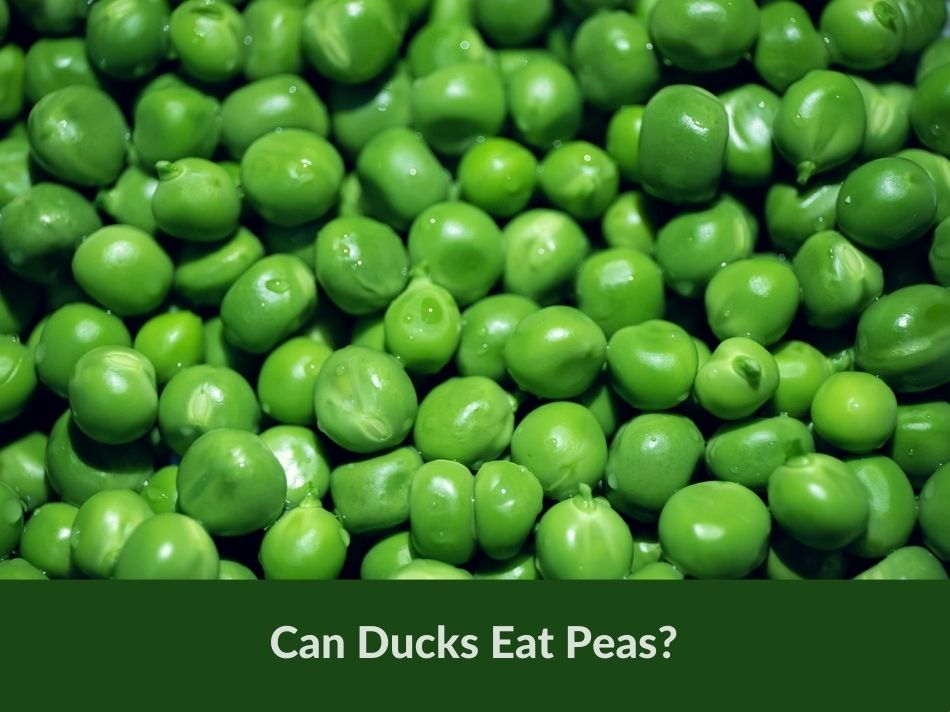In the wild, they feast on a combination of plants, insects, small fish, algae, and worms. Domestic ducks often enjoy a diet of pellets specifically formulated for waterfowl, but they also relish treats like leafy greens, vegetables, and even certain fruits. But, can ducks eat peas?
Yes, ducks can eat peas. They are a safe and duck-friendly snack that provides essential nutrients without the risk of obesity or other health complications when given in moderation.
In this article we will learn more about ducks eating peas as well as the many health benefits om them doing so. We also cover how to feed ducks peas and the nutritional value of peas.
How Often Can I Feed My Ducks Peas?
While ducks love peas, it’s essential to remember that treats should not make up a significant portion of their diet. You can offer peas to your ducks a few times a week, but it’s still important to feed them a balanced diet such as grains or duck pellets.
Can Ducklings Eat Peas?
Absolutely! Ducklings can nibble on peas, too. It’s important to mash or split the peas to prevent any choking hazard. Remember to introduce new treats slowly to their diet, always ensuring that ducklings have constant access to clean water when eating.
Peas Nutritional Value
Below is the nutritional value of 1/2 cup peas.
- Calories: 62
- Carbs: 11 grams
- Fiber: 4 grams
- Protein: 4 grams
It also contains several vitamins and minerals as listed below.
- Vitamin A
- Vitamin K
- Vitamin C
- Thiamine
- Folate
- Manganese
- Iron
- Phosphorus
[Source]
Are Peas Healthy for Ducks?
Peas are packed with nutrients like vitamin C, vitamin A, and various minerals, making them an excellent snack for ducks. They offer a good dose of fiber, which aids in digestion and can help in keeping your duck’s digestive system running smoothly.
Below is a list of the vitamins and minerals with a short description of their health benefit for ducks.
- Vitamin A: For ducks, Vitamin A is like the glint in their eye, quite literally. It plays an integral role in ensuring good vision, especially during those low-light evening swims. But that’s not all – it aids in maintaining healthy skin, feathers, and mucous membranes.
- Vitamin K: Quacktastic for blood and bones! Vitamin K aids in the blood clotting process, ensuring that our feathery friends can heal well from minor injuries.
- Vitamin C: This vitamin ensures that ducks don’t just waddle, but they waddle with zest! It plays a role in collagen synthesis, which aids in maintaining the health of skin, blood vessels, and bones.
- Thiamine: Or Vitamin B1, is crucial for our web-footed pals. It’s a major player in energy metabolism, ensuring that ducks can paddle, forage, and engage in their ducky antics with ample energy.
- Folate: Eggs, anyone? Folate plays an essential role in cell division and is particularly vital for laying ducks. It ensures the production of healthy eggs and prevents embryonic abnormalities.
- Manganese: This mineral ensures that ducks don’t just swim, they glide gracefully! Manganese is necessary for the proper formation of bones and connective tissues. It also plays a role in carbohydrate and amino acid metabolism.
- Iron: Ducks need iron to keep their blood rich and red, ensuring they transport oxygen efficiently from their bills to their tail feathers.
- Phosphorus: Talk about a building block! Phosphorus, paired with calcium, ensures that ducks have strong bones and beaks.
How To Feed Peas To Ducks
Feeding peas to ducks is a simple process:
- Choose Fresh Peas: Always opt for fresh or frozen peas over canned ones, as canned peas often contain added salt, which isn’t ideal for ducks.
- Preparation: If using frozen peas, ensure they’re thawed before feeding. For ducklings, you might want to mash or split the peas.
- Hand-feeding: Ducks often enjoy the experience of being hand-fed. You can offer peas directly, watching them eagerly snap them up.
- Floating on Water: Another fun method is to float peas on a water surface. Ducks enjoy foraging and will delightfully gobble up the floating peas.
More Vegetables Ducks Can Eat
Below are some more healthy vegetables that ducks can eat.
Conclusion
In the pond of duck treats, peas certainly float to the top as a favorite. They’re nutritious, safe, and duck-approved! Still like all treats, moderation is the key. Ensure your ducks have a well-rounded diet, with peas being the cherry (or should we say pea?) on top. Happy quacking!
Disclaimer: The information in this article is for informational purposes only. I'm not an expert or a veterinarian.


